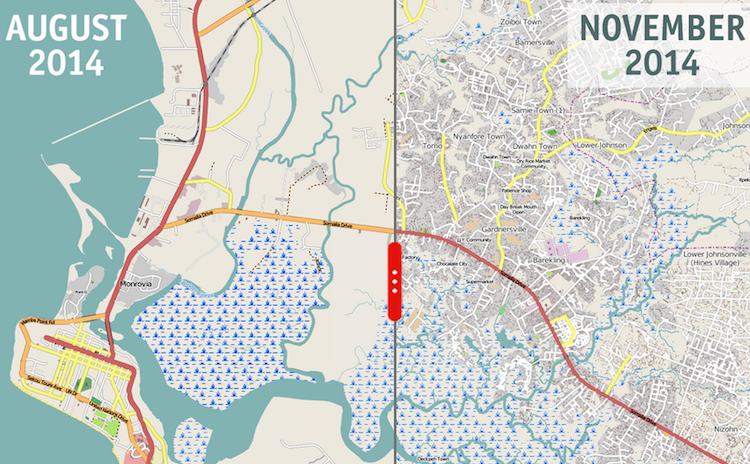MissingMaps.org and the long term solution
The Economist has a story, Off The Map, about the launch of MissingMaps.org which is a development out of OpenStreetMaps.
On November 7th a group of charities including MSF, Red Cross and HOT unveiled MissingMaps.org, a joint initiative to produce free, detailed maps of cities across the developing world—before humanitarian crises erupt, not during them.
I mention this here for multiple reasons.
1) OpenStreetMaps is a great resource and HOT has been active with the ebola response. OpenStreetMaps is the source for maps in the EbolaMapper project I am working on.
Although the current focus is the ebola outbreak, these open source tools that I am calling EbolaMapper can be easily repurposed for any future outbreaks, as they read their data via the generic <a href=”https://github.com/JohnTigue/EbolaMapper/wiki/Outbreak-Time-Series-Specification-Overview</a> APIs I am developing. Next time (and statistically that is likely to occur before 2020) there should be free, quality tools at the ready for people to quickly get started on outbreak monitoring without having to wait for large organizations to mobilize.
As I have gotten to know some of the folks who have been involved with responding to previous epidemic outbreaks, they sound like they are living through a nightmare version of Groundhog Day (Swine flu in 2009, SARS, etc.). Yet now this type of problem can be solved generic, mature, widely available Web technology i.e. it does not require complex novel technology that needs to be scaled massively. (On the other hand, we do need to be mindful that currently in Liberia “less than one percent of the population is connected to the internet.” [Vice News]).
With the current established culture of open source it would be shameful for this type of flatfooted, delayed response to occur again. We have the technology to enable local actors to immediately get started by themselves the next time there is an epidemic outbreak.
2) This is a perfect example of one way that funding in this weird space can be successful. Folks (private and public) trying to effectively allocate money can find open source and/or open data projects that are already working and then juice them with cash for scaling, which is always an aspect of the large success stories in open source.
This is a bizarre but exciting variant of the thinking of Steve Blank and the lean start-up folks as applied to open source business models. I say bizarre because the customers (those benefiting from public health and disaster relief projects like the ebola response) cannot pay and have no obvious monetizable value as users. Here the open-source community has found a successful model and now that it is proven out the funding organizations are providing the cash to accelerate tech development to scale, where normally that cash would come via a series A round with venture capitalists.
In many successful open source projects, tech companies are paying talent to produce code that will immediately be placed in essentially the public domain. The value of doing so is expertise status with paying customers and keeping that scarce talent in-house to service those customers.
As Marc Andreessen quipped on twitter:
“The best minds of my generation are thinking about how to make people buy support contracts for free software.” –Anonymous
But who is going to do the funding in disaster relief contexts, specifically for the maps and do so proactively? So, this is MissingMaps.org situations is great news.
3) This blog loves a good map visualization related to the ebola response. The Off The Map story has a neat one. In the above picture the red handle can be dragged left and right to see the before versus after map.
